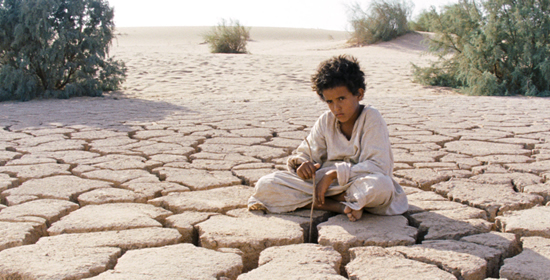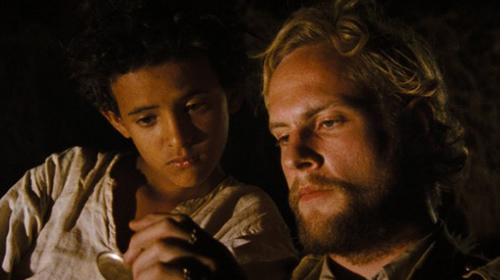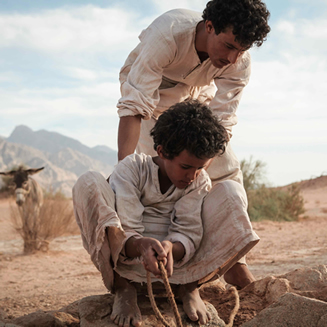The name of the character Theeb, is also the title of the film, could you explain the meaning behind that word?
Naji:
Theeb means wolf, and in Bedouin culture the wolf is a revered animal, for several reasons too. It has all of the qualities of Bedouin love, so it’s a pack animal, a tribal animal and Bedouin culture is very much about the tribe and the unity of the family. But at the same time, it is an individual that is alone and can hunt alone - which is again in the tradition of Bedouin culture of distinguishing yourself in great feats, or acts, and that is how you gain a reputation as a great warrior or great man. So it has got both those things, but it is also an ambiguous thing where it’s feared by the culture as a predator. So if I nickname you Theeb, it means that you are a guy of cunning, resourceful guy, you can achieve impossible feats, or if I challenge you, I say, do I give it to you or the wolf? Are you man enough to be a wolf? I really liked that, I like the idea that if your father names a son that he is putting on him and expectation of turning into a great man. So it is kind of how the journey of how a boy has to become that.
Where did you get the idea, or inspiration to do a film set in the time period and with this particular culture?
Naji:
It was two reasons, one from a conceptual point of view is that I love the Western genres and that they are set in this time of great change. The Sergio Leone films obviously, Once Upon a Time in The West, The Good The Bad and The Ugly, Outlaw of Josey Wales, The Searchers, The Ford Films', so they are all at the time of great change. So for me the ultimate change is the end of a 400-year empire, and this radically drawing up of the map that we are still now suffering the consequences, so that was an amazing drawing in thing. And from the practical point of view, the Bedouin especially the older men in the tribe and village, their fathers were involved. So they have got these very detailed stories of around that period, so it was also a great resource that we could get a lot of information on. So mainly those two combined.
Did you watch all of those films in inspiration for Theeb?
Naji: I love those films, so I have seen them all several times, and that was the conceptual beginning of the film, it started off in 2003, I saw Akira Kurosawa films, but I got to London and it was showing in the NFT [Now the BFI], and then found that you can buy all of the DVD's in HMV, so I just started eating away at those films. I loved the way that he adapted like a Ford-esqe approach to these Japanese Samurai movies. So I am like Bedouin culture is amazing for that, I could do the same thing.
I tried, but the first thing I ever did was a rip-off a Leone, Bedouin Western, it was terrible, awful and basically plagiarism. So I abandoned it, but when Bassel Ghandour - who is the writer and producer - wrote a short-film script and that was about the relationship between two Bedouin brothers who were in a hunting trip and they get stuck in a bad situation. I just knew that is how you do it that is the way in. But it was all conceptual, because really the meat and all of that comes from what happened with working alongside the Bedouin, although it is evidence that there are those western genre themes in the film, really it is about what we learnt from the Bedouin.
 Is there much of a film culture in the Bedouin regions? Is there much of a film culture in the Bedouin regions?
Naji: No, the first time they had ever been to a cinema was the world-premiere of the film in Venice. The first time they had saw a film, or even left the country. There was no film culture at all, which was difficult because to get them to be interested in acting and starring in the film. It wasn't like 'Oh, do you want to be an actor?' Well most people would go 'That is great, acting! - I will be a star' ... but they were disagreeing and would rather go and hunt, it sounds girly to me. So we had to make them as fun and energetic as possible so that they would want to come back for the pure fun and slowly we started developing and getting more sophisticated. So we eventually did an eight-month workshop. But I did show them a few Westerns, and they really loved them.
The landscapes in the film, shot by DP Wolfgang Thaler, were beautiful. Did you give him any tips on how it should look? As it fits into all of the films that you mentioned earlier.
Naji:
We talked a great deal, he was probably on the project about a year before we shot in the script stage. So we were always talking, and the big decision was to shot anamorphic, so we could get that aspect ratio and all of that kind of stuff was definitely a major consideration. The rest of it takes care of itself. The difficulties we had was trying to create a maze, it is supposed to be like a forest in a fairy-tale, so we had to have 360 degree mountains, and once they go through the passing I didn't want you to ever see the horizon touch the sky. I wanted them to always be surrounded by mountains. But that was more about the locations.
Just on from that, the music is very grand-esqe and fits into the elusive landscapes. Can you explain the choices and origins?
Naji: It is all based on Bedouin vocal melodies. I was living there for a year, and every-time someone had a little thing, I would collect or record the songs when the tribesman started singing. So I had an album of their type of music. There is one called the red-sea melody - which is the central musical theme to the film, and the counter melody. So we worked Jerry Lane the composer to try and translate that into a cinematic language. But the origins were all Bedouin.
Jack: How did you approach this character, as he is very much like Indiana Jones!
Jack:
That's nice! I tried to work out what his main goals were, what is desires were, and what his most important things were in terms of a list. I think at the top of this list were Queen and Country, and there were a lot of people that signed up for that war just out of responsibility, not even out of conscription. I think that there were stories of Haggen, and people crossing and you could hear gunfire from Dover even, or people crossing those bridges and over 10,000 people dying each day. I think he was just hell-bent on achieving what he needed to above all costs and measures. I think it was more a formality him having to approach Sheikhs. Permission orientated those relationships were initially, I think he just knew that at all costs he had to do it to the demise of many in his life. I think that his wife at home, and I certainly laid that in my mind a lot, that he missed her a lot and if he was going to be away and not with her then it would be for the right reasons, not the wrong ones. He wasn't go to let anyone stand in the way of that.
Naji and I had big conversations of how he wanted him to look and a beard was always something that came up because of Garland, and Naji was very on the nose with that. When I arrived we each had a booklet each of what we thought the character should be like and they very much merging. Then riding obviously, Naji was brilliant in letting me hang out with the Bedouin guys and they thought me how to ride a camel, so that he was able to look very confident and able on whatever would move him around I thought. The costumes I thought was also a terrific job, and there were a million different things brought that character together, but a lot of them were outside of my control I think, it was hard-work done by everyone.
 You mentioned that Wolfgang joined earlier near the script-phase, and the musical culture. Was there much other research involved in getting it from genesis to the final screen feature? You mentioned that Wolfgang joined earlier near the script-phase, and the musical culture. Was there much other research involved in getting it from genesis to the final screen feature?
Naji:
Yeah, there was a great deal of historical research done with photographic, and before we moved on with the Bedouin there was lots of visits to the Bell Archives and American Library of Congress, just to see what is going on with the types of weaponry, the clothes, everything that was happening in that world. Then once all of that was in place, it was all about the Bedouin, we moved in and brought in a lot of other people and began collaborating very early, which is what I like to do. So the Sound Designer was involved from the first or second draft and script notes joined together.
This is your first time writing and directing a feature film, can you describe any challenges or what you have learnt about yourself from it?
Naji:
I have learnt how little I know *laughs* I have a lot of hard work to do. But because it is a first-time you realize how much you have to learn and improve. The difficulty was for me, as we were such a low budget film, I had to rewrite most days as we couldn't get up with the schedule, and it was a journey film, so we were always moving locations. So if you don't get your location or rewrite, then the film is over, it is done. The second week if I didn't rewrite we could have packed up and went home if I hadn't sorted out the script. So that was intense, you could come back to the tent with your head-lamp and try to sort out a major scene like that and it is a brain teaser. But when you are working with people that you love working with, and you have a great team, then it is a fun process. It was enjoyed. The film possibly ending everyday was a nerve racking experience definitely.
Jack, you are in a way one of the more professional actors in the film, in a field of non-actors. Did you give any advice or pick anything up yourself?
Jack:
I think it was just one of those things, because the casting process in terms of non-actors so to speak was sort of 250-11 or something like that, those are sort of drama-school odds. That is like 1-10. So by the time I got there it wasn't like turning up and going 'what the hell is going on...' - it was turning up and everyone knew what was going on. There were some very small technical things like blocking perhaps, or timing moments to lean across in a camera shot. But very few moments, and it was not an issue on anything. In terms of advice, it was more like they were telling me what to do, such as when the camel does this - don't hit it. It was more them giving me advice on that sort of front. Plus Naji had lived there for nine months, so they listened to whatever he had to say. It never actually felt like they were non-actors.
How did you audition or cast the actors in the film?
Naji:
So we went around all of the little villages in the south and southern desert and we had little meet-and-greet days, where we would ask people what they thought about that period, and we would select a few of them and do taped interviews. The questions were designed to see if they had that imagination, if they were open to sharing emotion, if they we willing to try something different and new. Once we got a few ticks on those boxes we thought we would really consider that person. There was a long process of taking that down to about twenty. Then we did weekend workshops and we did acting games and saw who was up for it again on another level. We then got it down to about eleven. Then we finally started an eight-month acting workshop, and that was a combination of studying films that we loved, such as City Of God (which I love!), we also had an acting coach come in for four days at the beginning of the workshop and four days at the end to help devise the curriculum, and get everything tailored to their culture. It was about taking traditional acting, teaching and taking it to Bedouin culture and translating it.
 At what point of the film did you join on Jack? Was it early on in this process? At what point of the film did you join on Jack? Was it early on in this process?
Jack:
I remember the exact day that I got the script, because it was three days after my birthday, so it was the 20th of September, so it must have been about a month before that process. It was one of those things that my agent sent to me, he can quite funny about being sent stuff to read, but he read it and thought it was terrific and said that I should read it too. I was on holiday, but he said firmly - 'you should read it'. So I read it and I loved it, and Naji ask me to send over a tape of one of the scenes in the movie. So I sent it over to him via Greek internet to Jordanian internet and we then had a conversation for two hours. We got on like a house on fire. It was then just a case of when came I come out and he wanted me out there a week before to meet everyone and learn how to ride a camel, that was it. I mean what a bloody delight.
Just going on from the very good script that you read, the film was shown at the Venice Film Festival early this year, and it got a ten-minute standing ovation - which is fantastic - and you also won the Orizzonti award. Can you explain this reaction and how it was received at this year’s London Film Festival also?
Naji:
It is an outer-body experience, it is insane, we were just happy - yet nervous. But when we got to the premiere at that happened - wow. That is going to stay with me for the rest of my life. The energy of the crowd was just nephritic and amazing.
Jack: He was in tears. I tell you what was crazy, you was saying that when you lived in Jordan and you had been to funerals and marriages and all of those sort of things and you had never seen the Bedouin's cry, but at the premiere they cried from The pressure and everything. It was these 1400 people all just converging their emotions.
Naji:
These guys [Bedouin] had never even been in a cinema, but it was insane. It was too much for them to take in and they started crying. It was madness. Literally his mother could have died they would not cry. The men were not allowed to cry, but when I saw them they got me going *laughs* ... But I loved it. Jacir Eid - the main boy, Theeb - he had people come up to him with a pad and pen. He just stood there not knowing what to do. So I explained that they just want you to write your name so they can remember you. By the second day he was a professional *laughs* |
